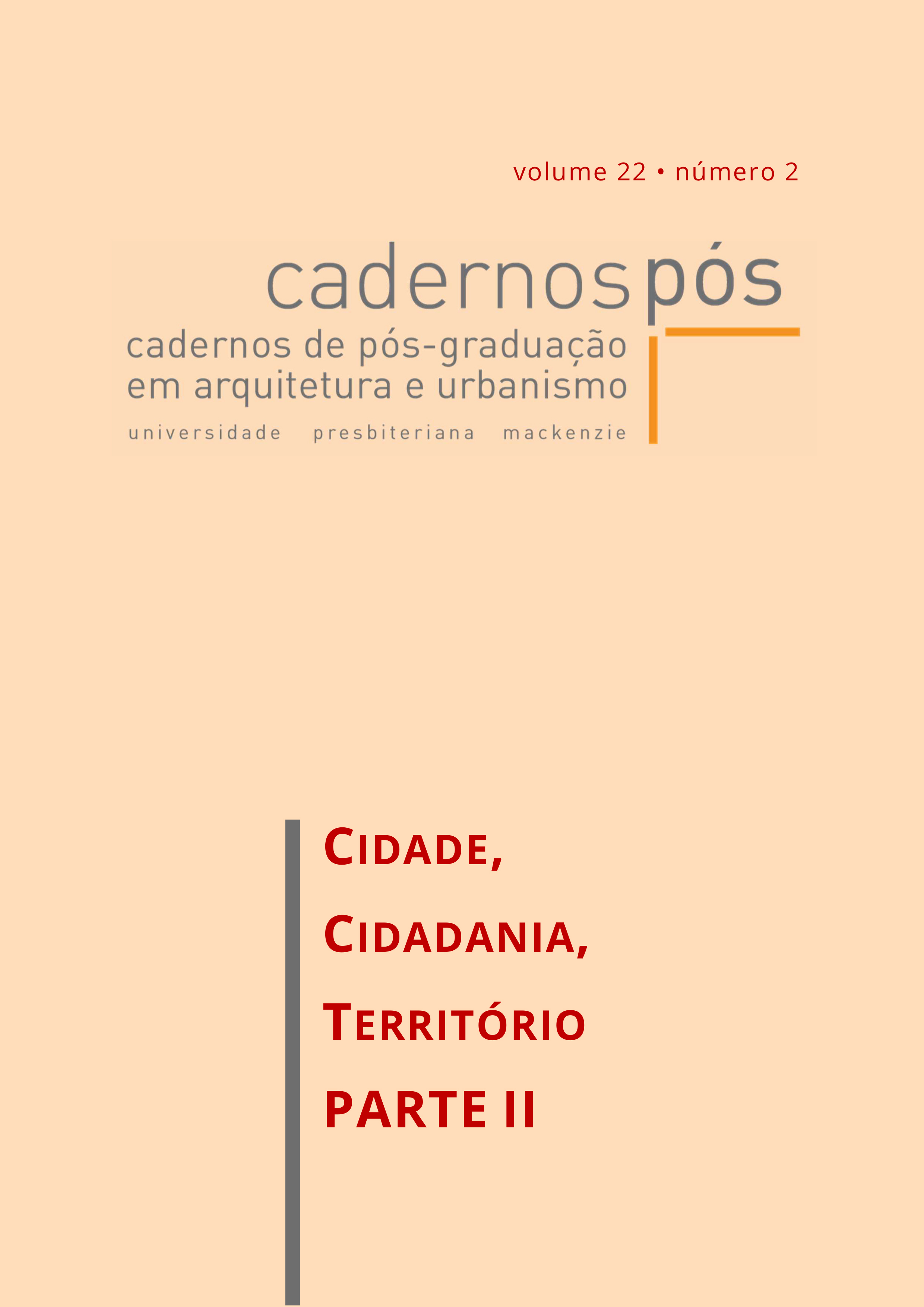Architecture as protagonist in a collapsing world
DOI:
https://doi.org/10.5935/cadernospos.v22n2p08-21Keywords:
Systemic alternatives; Anthropocene; Commonality; Dominant paradigm; Sustainability; Vulnerability and risk.Abstract
This article proposes a debate and reflection on the protagonism of architecture in the
collapsing world. Protagonist in the processes of degradation and extractive socioenvironmental
exploitation, in a cartesian, developmental scientific model, and at the
same time potential protagonist of systemic alternatives that contribute to the reversal
of the processes of exhaustion of the capacity to support life on the planet. To this end,
it establishes a dominant and beginning temporal arc of this process as the beginning
of the Anthropocene, around 1610, according to the reading and analysis proposed by
Lewis and Maslin (2015), relating this milestone to the beginning of the Sixth Great
Extinction, as presented by Elizabeth Kolbert (2015). From this perspective, it presents
a reflection on the expressions of this dominant paradigm, its transformations, and
contradictions, until the moment of rupture and glimpses of a new possible world.
Downloads
References
ACOSTA, A. O bem viver. São Paulo: Elefante Editora, 2019.
ACOSTA, A; BRAND, U. Pós-extrativismo e decrescimento, saídas do labirinto
capitalista. São Paulo: Elefante Editora, 2018.
ACOSTA, A. et al. (org). Pluriverso, um dicionário do pós-desenvolvimento. São Paulo:
Elefante Editora, 2021.
ALIER, J. M. O Ecologismo dos pobres. São Paulo: Contexto, 2018.
BENJAMIN, W. Gesammelte Schriften. In: ACOSTA, A; BRAND, U (org.). Pósextrativismo
e decrescimento, saídas do labirinto capitalista. São Paulo:
Elefante Editora, 2018. v. 1. p. 5.
CARSON, R. Silent spring. California: Mariner Books, 2002.
CLAUDIA Andujar: a luta yanomami. IMS, [s. d.]. Disponível em:
https://ims.com.br/exposicao/claudia-andujar-a-luta-yanomami-ims-rio/.
Acesso em: 7 abr. 2022.
DUBAI seen pressing for time in hopes of market recovery. Reuters, 22 dez. 2009.
Disponível em: https://www.reuters.com/news/picture/dubai-seen-pressingfor-
time-in-hopes-of-idUSTRE5BL3I120091222. Acesso em: 7 abr. 2022.
EXÉRCITO ZAPATISTA DE LIBERTAÇÃO NACIONAL. Quarta declaração da selva
Lacandona (1996). In: KOTHARI, A. et al. (org.). Pluriverso. Um dicionário do
pós-desenvolvimento. São Paulo: Elefante Editora, 2021.
FREY, A. In search of a living architecture. Nova Iorque: Architectural Book Publishing
Company, 1939.
FREY, K.; GUTBERLET, J. Democracia e governança do clima: diálogos Norte-Sul. In:
TORRES, P. et al. (org.). Governança e planejamento ambiental: adaptação e
políticas públicas na macrópole paulista. Rio de Janeiro: Letra Capital, 2019. p. 25-34.
FULLER, B. Operating Manual for Spaceship Earth. Illinois: Southern Illinois University
Press, 1969.
GEORGESCU-ROEGEN, N. O decrescimento, entropia, ecologia, economia. São Paulo:
Senac, 2012.
GILDING, P. A grande ruptura: como a crise climática vai acabar com o consumo e
criar um novo mundo. Rio de Janeiro: Apicuri, 2014.
GOLDHAGEN, S. W. Welcome to our world: how the built environment shapes our
lives. Nova Iorque: Harper Collins, 2017.
GORTÁZAR, N. G. O novo olhar de Sebastião Salgado sobre Serra Pelada. El País, 29
jul. 2019. Disponível em: https://brasil.elpais.com/brasil/2019/07/26/cultura/
_ 876694.html. Acesso em: 7 abr. 2022.HAGAN, S. Taking shape:
a new contract between architecture and nature. Oxford: Architectural
Press, 2001.
HANDMADE school/Anna Heringer + Eike Roswag. ArchDaily, 4 mar. 2010.
Disponível em: https://www.archdaily.com/51664/handmade-school-annaheringer-
eike-roswag/5008955428ba0d50da00116c-handmade-schoolanna-
heringer-eike-roswag-photo. Acesso em: 7 abr. 2022.
KHAYATI, M. Captive words: preface to a situationist dictionary. In: KOTHARI, A. et
al. (org.). Pluriverso. São Paulo: Elefante Editora, 2021.
KOLBERT, E. A sexta extinção, uma história não natural. Rio de Janeiro: Intrínseca,
, edição digital.
KUHN, T. S. A estrutura das revoluções científicas. São Paulo: Perspectiva, 2018.
LATOUCHE, S. Pequeno tratado do decrescimento sereno. São Paulo: WMF Martins
Fontes, 2009.
LATOUR, B. Down to earth, politics in the new climatic regime. Cambridge: Polity, 2018.
LEWIS, S.; MASLIN, M. A. Defining the anthropocene. Nature, v. 519, p. 171-180, 2015.
LIMA, A. G. G. Arquitetas e arquiteturas na América Latina do Século XX. São Paulo:
Altamira, 2014.
LIMA, A. G. G.; LOEB, R. M. Cidade, gênero e mudanças climáticas: parelheiros como
estudo de caso na capital paulista. Ambiente & Sociedade, São Paulo, v. 24, p.
-21, 2021.
LOEB, R. M. Territórios vulneráveis, arquitetura e urbanismo: estratégias
contemporâneas de ação. 2019. 135 f. Dissertação (Mestrado em
Arquitetura e Urbanismo) – Faculdade de Arquitetura e Urbanismo,
Universidade Presbiteriana Mackenzie, São Paulo, 2019.
LOVELOCK, J. A vingança de Gaia. Rio de Janeiro: Intrínseca, 2006.
MORA, C. et al. Broad threat to humanity from cumulative climate hazards
intensified by greenhouse gas emissions. Nature Climate Change, v. 8, p.
-1071, 2018.
NICOLESCU, B. Um novo tipo de conhecimento: transdisciplinaridade. 1º Encontro
Catalisador do CETRANS - Escola do Futuro - USP, Itatiba, São Paulo: USP, 1999.
OXFAM. O vírus da desigualdade. Unindo um mundo dilacerado pelo coronavírus por
meio de uma economia justa, igualitária e sustentável. Oxford: Oxfam, 2021.
PELIZZOLI, M. L. Ética e meio ambiente para uma sociedade sustentável. São Paulo:
Vozes, 2013.
RUDOFSKY, B. Architecture without architects. Nova Iorque: Doubleday & Company, 1964.
RUDOFSKY, B. The prodigious builders. New York: Harcourt Brace Jovanovitch, 1977.
SACHS, W. (ed.). The development dictionary: a guide to knowledge as power.
Londres; Nova Iorque: ZedBooks, 2010.
SCHUMACHER, E. F. Small is beautiful: economics as if people mattered. Nova
Iorque: Harper Perennial, 2010.
SOLÓN, P. (org.). Alternativas sistêmicas, bem viver, decrescimento, comuns,
ecofeminismo, direitos da Mãe Terra e desglobalização. São Paulo: Elefante
Editora, 2019.
Downloads
Published
Versions
- 2023-02-26 (2)
- 2022-07-01 (1)
How to Cite
Issue
Section
License
Authors who publish in this journal agree to the following terms:
a) Authors retain the copyright and grant the journal the right of first publication, with the Project simultaneously licensed under the Creative Commons Attribution License that allows the sharing of the Project with recognition of the authorship and initial publication in this journal.
b) Authors are authorized to assume additional contracts separately for the non-exclusive distribution of the version of the Project published in this journal (e.g., publishing in an institutional repository or as a book chapter), indicating that it was originally published in this journal, with a link to the article.








 Todo o conteúdo de Cadernos de Pós-Graduação em Arquitetura e Urbanismo está licenciado sob
Todo o conteúdo de Cadernos de Pós-Graduação em Arquitetura e Urbanismo está licenciado sob 